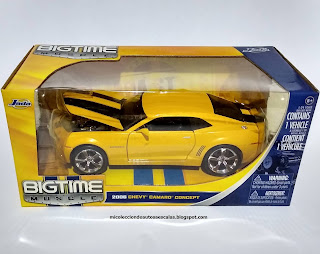The Camaro received a complete redesign and new platform in 2009 for the 2010 model year and fifth generation. Based on the 2006 Camaro Concept and 2007 Camaro Convertible Concept, production of the fifth-generation Camaro was approved on August 10, 2006. The Oshawa Car Assembly plant in the city of Oshawa, Ontario, Canada, began producing the new Camaro which went on sale in spring of 2009 as a 2010 model year vehicle.
Following the development of the Zeta architecture and because of its position as the GM global center of RWD development, GM Holden
in Australia led the final design, engineering, and development of the
Camaro. Production of the coupé began on March 16, 2009, in LS, LT, and
SS trim levels.
LS and LT models are powered by a 3.6 L (220 cu in) V6 producing 312 hp
(233 kW) for the 2010 and 2011 models mated to either a 6-speed manual
or a 6-speed automatic with manual shift. The SS is powered by the 6.2 L
(376 cu in) LS3 V8 producing 426 hp (318 kW) and is paired with a
6-speed manual. The automatic SS has the L99 V8 with 400 hp (300 kW).
The RS appearance package is available on both the LT and SS and
features 20-inch wheels with a darker gray tone, halo rings around xenon
headlamps, a unique spoiler, and red RS or SS badges.
In addition to the original 2012 Camaro LS model. Chevrolet has
manufactured the 2LS model. The 2LS model uses a slightly different rear
axle ratio than the original LS. Having a 2.92 rear axle ratio
increased fuel economy to about 19/30 miles per gallon. The base engine
2012 model had a higher redline than previous V6 models, now reaching
7200RPM; delivering an overall boost in the power and performance of the
car. Almost all 2LS models have been released with various styles of a
rear spoiler on the back as well. The 2LS was made to have better fuel
mileage than the Camaro LS.
On April 1, 2010, the Camaro was named the World Car Design of the Year at the World Car of the Year Awards.
In late January 2011, the production of the 2011 Camaro Convertibles started. The first going to Rick Hendrick via Barret-Jackson
Car Auction. Convertibles had the same options as the coupé (engines,
RS, SS, etc.). The Camaro convertible added an aluminum brace over the
engine assembly, and under the transmission. Due to the 2011 Fukushima earthquake, certain pigments were not available to make certain colors.
In November 2011, the export version (excluding the Japanese
version) of the Camaro was introduced after a two-year delay. The delay
was due to unexpected domestic demand. The export version included
different tail lamps
with integrated reverse and amber turn signal lamps, larger external
rearview mirrors with integrated side turn signal repeaters, a rear
bumper without reverse light inserts, and other changes as to comply
with ECE regulations.
Although not in continuous production for the entire period, the
2012 model year marked the 45th anniversary of the Camaro and this was
commemorated with a model available only in "Carbon Flash Metallic"
paint. This edition Camaro also included a unique stripe package, red,
white, and blue interior stitching as well as 45th edition exclusive
20-inch wheels. The V6 was updated to a 3.6 L "LFX" engine producing
323 hp (241 kW). The SS model received an upgrade to the suspension
system. All models received the RS spoiler and taillight details,
steering wheel-mounted volume and radio controls, and Bluetooth
connectivity controls as standard. The 2012 ZL1 Camaro included a 6.2 L
LSA supercharged V8 producing 580 hp (430 kW). This engine was first
used in the Cadillac CTS-V for the 2009 model year. Other features
included a 2-stage exhaust, the addition of suede seats, steering wheel,
and shift knob, as well as ZL1-exclusive 20-inch aluminum wheels. In
2012, Chevrolet unveiled the production of the 2013 Camaro ZL1
Convertible.
The 2014 Camaro was unveiled at the 2013 New York Auto Show, with a refreshed body style and the return of a Z/28 model.
Upgrades included a slimmer grille along with a larger lower fascia and
new fog lights along with taillights that took styling cues from the
original first-generation Camaro. The RS appearance package incorporates
LEDs into both the headlights and taillights. The Z/28 model features a
high-performance 7.0 L LS7 V8 engine that produces 505 hp (377 kW),
the same engine used in the C6 Z06 Corvette. The new Z/28 features
upgrades intended to improve lap times, and as with the original Z/28,
air conditioning is an option. The Z/28 model retains only one speaker
for the seat belt chime, the rear quarter glass has been thinned, rear
seats have been thinned, and most of the sound deadening has been
removed in an effort to reduce the weight of the vehicle.











































